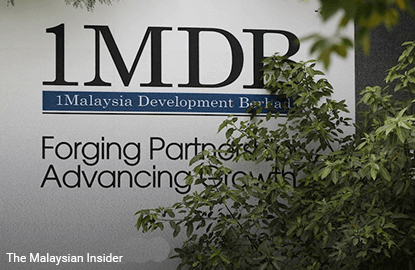
KUALA LUMPUR (Sept 25): 1Malaysia Development Bhd (1MDB) said it has sold over RM1 billion worth of land in its Tun Razak Exchange (TRX) project this year and that final, binding bids for both Edra Energy Bhd and Bandar Malaysia will be received from shortlisted international and domestic bidders between mid- and end-October.
In a statement today, the state development fund also said the sale and purchase agreements for both Edra and Bandar Malaysia will be executed by December 2015.
It reiterated that its rationalisation plan is now being implemented as planned, which involves, among others, a 'debt for asset swap' with International Petroleum Investment Co (IPIC), a sale of equity in Edra Energy, a sale of equity in Bandar Malaysia, a sale of master-planned land in TRX and the disposal of non-core assets.
"The combined proceeds from the rationalisation plan will substantially reduce 1MDB's debt, to a sustainable and manageable level by 4Q (fourth quarter of) 2015," it said.
The fund also said it has consistently met, with no default, its interest service and principal repayment obligations to both foreign and domestic lenders.
The statement was issued following Penang chief minister Lim Guan Eng's remarks on Malaysia's credit rating in the junk category by credit-default-swap (CDS) traders yesterday, indicating that the blame rests on 1MDB.
"This is another indication that our economy is at another crisis status. Once again, we know what is the cause. Bank Negara Malaysia Governor Tan Sri Dr Zeti Akhtar Aziz has said that the principal cause is 1MDB," Lim had reportedly told pressmen in Penang yesterday, according to The Malaysian Insider.
Bloomberg had reported on Wednesday that two weeks after Brazil's credit rating was lowered, CDS investors were punishing other emerging markets facing similar challenges, sending their implied sovereign ratings way below their official figures.
The news agency said Moody's Corp rated Malaysia A3, although traders saw it six levels lower at Ba3. South Africa, which is a Baa2, is viewed as a B1 borrower.
On the same day, CIMB Group chairman Datuk Seri Nazir Razak had also raised concerns over the fact that the market was much more negative about Malaysia's credit rating than the rating agencies, and urged authorities to answer ongoing financial controversies.
"This is worrying. The market is much more negative about Malaysia than the rating agencies, taking us into junk category, way below our fundamental. Suspect it's due to so much negative coverage in WSJ, FT and NYT — all capital people read at least one if not all of them.
"We have to change the current narrative about Malaysia with answers or legal suits; can't just ignore them," said Nazir.
1MDB's statement today also slammed Lim's comments as "unsubstantiated", adding that CDS is a derivative financial instrument, and its values are determined by traders, through demand and supply and do not necessarily reflect economic facts or fundamentals.
"In this regard, a CDS spread is a very different indicator to Malaysia's 'A- / A3' credit rating, which reflects the strong ability of the Malaysian government to service its debt obligations, with a low probability of default," it added.
Meanwhile, it noted that the Malaysian government has guaranteed RM5.8 billion of its debt — of which RM5 billion is due in 2039 — and provided a letter of support for a US$3 billion bond issued by the fund, which is due only in 2023.
1MDB said at current exchange rates, the principal amount of this long-term debt is approximately RM18.7 billion.
This, it said, equates to about 1.7% of Malaysia's 2014 gross domestic product of about RM1.1 trillion, and about 2.9% of central government debt of approximately RM628 billion in the second quarter of 2015 (2Q15).
"Accordingly, whilst there is a contingent liability on the Malaysian government, 1MDB is confident, based on the facts and fundamentals above, that it will continue to meet its debt service obligations from a successful implementation of the rationalisation plan," it added.
(Note: The Edge Research's fundamental score reflects a company’s profitability and balance sheet strength, calculated based on historical numbers. The valuation score determines if a stock is attractively valued or not, also based on historical numbers. A score of 3 suggests strong fundamentals and attractive valuations.)